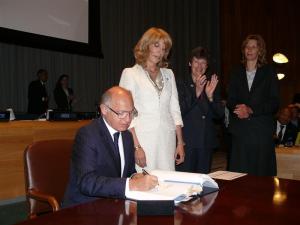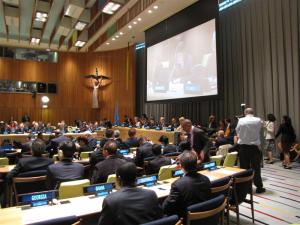The Arms Trade Treaty (ATT), which was signed by 67 states last week, offers a much needed response to the human suffering caused by the widespread availability of weapons. The new Treaty stipulates that states must not transfer weapons or ammunition, if they know that these would be used to commit certain war crimes.
The UN Secretary-General Ban Ki-moon’s stated:
“I wholeheartedly welcome the adoption, today, of a first-ever Arms Trade Treaty by the General Assembly. It is a historic diplomatic achievement — the culmination of long-held dreams and many years of effort.”
The Treaty was adopted by vote by 154 members states on the 2nd of April 2013, with 23 abstentions and only three countries voting against – North Korea, Iran and Syria. Ban Ki Moon was optimistic about the impact this legislation will make in addressing human rights violations and armed conflict.
“It will be a powerful new tool in our efforts to prevent grave human rights abuses or violations of international humanitarian law. And it will provide much-needed momentum for other global disarmament and non-proliferation efforts.
I applaud states for their willingness to compromise on a number of complex issues, thus making it possible for us to have a balanced and robust Treaty text. I commend the members of civil society for the critical role they played from the inception of this process, through their expert contributions and enthusiastic support.”
The United States’ representative emphasised that “This Treaty sets a floor, not a ceiling” for the regulation of the international trade in conventional arms. Stating that when taken together, the Treaty’s articles provided a “robust and complementary” framework that would “ensure responsible behaviour” by state parties.
South Africa’s delegate added that the Treaty “filled a glaring gap” in the global conventional arms control system, by introducing high norms and criteria to which states would adhere when considering arms transfers. Under the Treaty state parties will be required to establish national transfer control legislation, as well as official administrative guidelines, national inspectorates, punitive and practical enforcement measures for transgressions.
Among those not in favour of the Treaty, Syria’s delegate pointed out that a number of states were supplying weapons to “terrorist groups” including those in Syria, and that this explained why they objected to a paragraph banning the supply of weapons to unauthorized non-State actors. “This is political hypocrisy, and a clear indication that the draft Treaty is greatly selective and, thus, cannot reach consensus.”
However, the representative of Colombia, Néstor Osorio, who was also speaking on behalf of a number of other countries (the Bahamas, Belize, Chile, El Salvador, Guatemala, Jamaica, Mexico, Peru, Trinidad and Tobago and Uruguay), said in the circumstances the resulting text was the best that could have been achieved. As it “created a common international regime to regulate the arms trade, and offered the chance to further develop a more robust control regime, notably through amendments to the Treaty and adjustments to implementation at the Conferences of States Parties”.

The delegate of Argentina signing the ATT, 67 states have signed the Treaty since it was opened for signature on the 3rd of June last week.
The ambassador of Australia, Peter Woolcott received praise for the transparent manner in which he conducted his presidency of the Final Conference that produced the final version of the text. Ambassador Roberto García Moritán of Argentina, was also recognised for his longstanding commitment and staunch leadership of the ATT process.
The adoption of this Treaty demonstrates the instrumental function of the United Nations in providing a platform through which governments and civil society can work together. Ban Ki Moon indicated that the adoption of the Treaty is only the first step and called upon “all Governments to join forces with civil society to ensure its full and effective implementation”.



Pingback: The Story Behind the Treaty | tashalaw